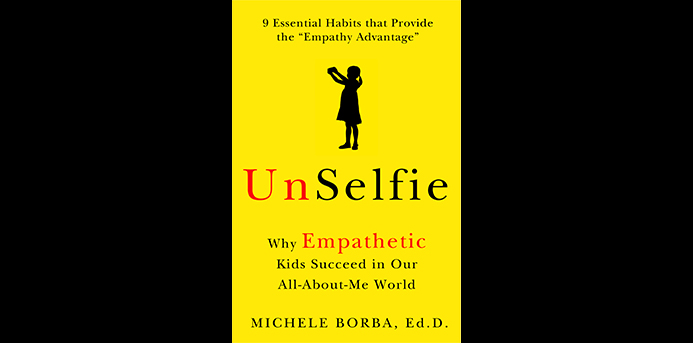Parents eager to ensure the long-term success of their children typically think it’s most important to focus on academic success, or finding just the right extracurricular activity that taps into a child’s talents. What they often miss, however, is the critical role that teaching empathy plays in setting up a child for future success and happiness.

In her forthcoming book, “UnSelfie: Why Empathetic Kids Succeed in Our All-About-Me World” (available June 7), Michele Borba, EdD, explains exactly why empathy is so crucial, arguing that it is the antidote to the self-absorption so prevalent in our kids today.
Empathy Crisis
“Our capacity to care has plummeted and self-absorption skyrocketed,” says Borba. Our society is experiencing an empathy crisis, she says, citing studies that find kids today are 40 percent less empathetic than they were 30 years ago. Narcissism is also up by 58 percent.
“In all fairness to parents, we have been told that the gateway to success is a GPA and a test score,” says Borba. “In the past 10 years in particular, we’ve put our energy into helping kids achieve because we want them to be happy and successful. Grades matter but there’s no longer a balance. We are not emphasizing empathy because we think it has no long-range impact on our kids, but it does.”
Today’s kids tend to be under more stress than in the past, which contributes to the empathy crisis. “There is an empathy gap because when kids don’t have skills to handle stress, they are in survival mode,” explains Borba. “It’s much easier to keep empathy open when you know how to keep stress at bay.”
The Empathy Advantage
“UnSelfie” convincingly argues that empathetic kids are best equipped to succeed. Borba says she was very surprised to see the longitudinal studies showing that kids with empathy fare better in the real world, and that their relationships are more authentic. They also fare better in the job market. “We are raising smart kids, but what employers need most are collaborators who understand clients and customers and where they’re coming from. That requires empathy,” says Borba.
Borba identifies nine proven habits she says make up what she calls the Empathy Advantage: Emotional Literacy, Moral Identity, Perspective Taking, Moral Imagination, Kindness, Collaboration, Self-Regulation, Moral Courage, and Compassionate Leadership. She says all of them are better predictors of future success in our global world than grades and awards.
“Michele Borba’s work is groundbreaking because it unapologetically reminds us what we all know to be true: Empathy is key and alarmingly missing in so many online and in-person interactions,” says Galit Breen, author of “Kindness Wins: A Simple, No-Nonsense Guide to Teaching Kids to Be Kind Online.”
Empathy Can Be Taught
“One of our biggest mistakes as parents is assuming that empathy is a temperament. It’s not. It needs to be cultivated or it stays dormant,” Borba says. She encourages parents to view empathy as a talent, one that can be developed and practiced just like playing a sport. “We exercise muscles, but not our hearts,” she says.
Borba maintains that children are not born empathetic, but she cites research from the Infant Cognition Center at Yale University that shows that babies already have the affinity for kindness.
“We need to start earlier and start stronger,” she says of shifting kids’ focus from me and mine to us and ours.
If you have an older kid who is already a fan of selfies, don’t despair. Borba says that while it is easier to teach empathy to younger children, the empathy ship has not yet sailed for teens and even adults. “It’s never too late to start,” she says.
Learning empathy is similar to learning anything else — practice makes perfect, and skills build upon each other. The book is structured to teach one habit at a time, and with nine chapters, if you work on one a month the book spans the academic year. Skills can be as simple as smiling and saying hello, then doing two kind things a day, and as one becomes ritual and routine, another can be added.
Borba offers teaching tools and activities for all ages at the end of each chapter. Her methods are customizable to your family, with varying suggestions targeting toddlers and preschoolers, elementary school-aged kids, and tweens and older kids.
Children with special needs often have a heightened level of empathy, though sometimes it shows up in different ways. Borba notes that each child comes to empathy from a different place. “Some children will have an easier time learning empathy, and some will have a harder time, so it is up to us as parents to find the way to reach our children. As parents we have to have empathy and take the perspective of our kids to help them,” she says.
What Parents Can Do
“UnSelfie” offers close to 500 tips that have been proven to encourage empathy. Rosalind Wiseman, author of “Queen Bees and Wannabes” and “Masterminds and Wingmen,” calls them “wonderful and practical ways to reconnect with our children and guide them so they can develop healthy relationships with others.” She adds, “And really, her advice doesn’t only apply to our children. We would all do well to follow Borba’s advice.”
One simple thing parents can do is to recognize kindness in others and encourage kids to do the same. If kids are looking for those behaviors, they are likely to start doing them themselves.
How parents praise kids also matters, as focusing on self-esteem often backfires, leading to narcissism while derailing empathy. It’s OK for kids to think that they’re special, but Borba cautions that it is not OK for kids to think that they are the most special. They need to recognize that everyone else is special, too. She says specific praise can help kids understand why they are special and that simply adding “because” when praising a child takes praise from generic to specific, making it more effective and allowing kids to see the impact of their actions.
Another step parents can take is to create a family mantra. She says that a simple statement can provide the moral authority needed to forward empathy. “We do this in business and in school, but not as a family. But it’s so easy to sit down and create it together,” advises Borba. “It becomes the child’s inner voice because mom and dad say it over and over,” she says.
She says it can be as simple as “In this family, we help others,” or “We help, not hurt.” Reminding kids of the mantra can be helpful when disciplining.
While the selfie trend of kids posting endless photos of themselves on social media isn’t going away, it’s all the more reason for parents to emphasize the benefits of focusing on others. This starts with both kids and parents putting down devices. “You don’t learn empathy from facing a screen, you learn it facing another person,” explains Borba. “Face-to-face connections will restore relationships with kids and increase their capacity to empathize with others.”
The relationships that benefit the most may just be the parent-child relationships. “We are flunking Listening 101. Kids from toddlers to teens say the same thing. They want to see our eyes, not our devices,” says Borba.
Borba also encourages moms and dads to keep the big picture in mind. “What we do too often as parents is make to-do lists and think what we do matters, but in reality it is who you are,” stresses Borba. “Forty years from now, your kids will not remember that you got everything done in your life. They will remember that you were kind.”
[takeaction]
More from Make It Better:

